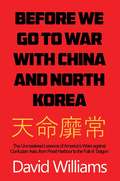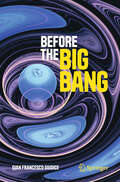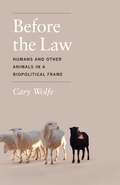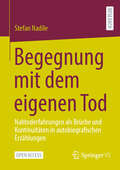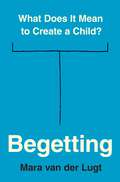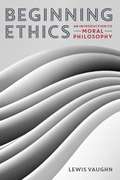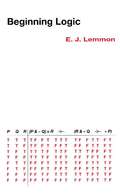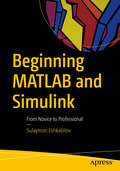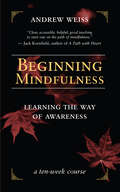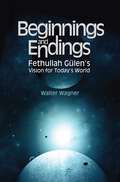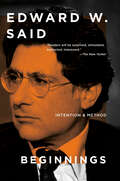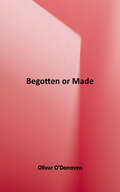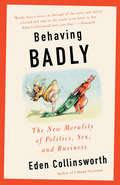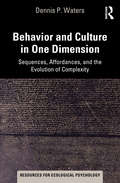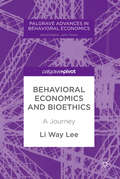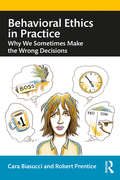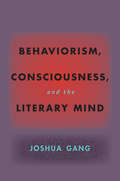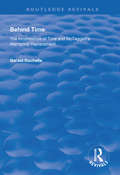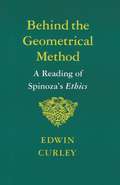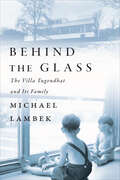- Table View
- List View
Before We Go to War with China and North Korea: The Unmastered Lessons of America's Wars Against Confucian Asia, from Pearl Harbor to the Fall of Saigon
by David WilliamsA war with China and North Korea is not inevitable, but neither is an American victory should such a war come. To prepare Americans for all eventualities, we might want to learn more about how East Asians think and fight. In such matters of grave seriousness, our past may become our prologue. We have engaged in five wars with Confucian Asia since Pearl Harbor. As we have had one victory, one stalemate and three defeats, it may be time to master the lessons of these struggles before we go to war with China and North Korea.
Before the Big Bang (Copernicus Books)
by Gian Francesco GiudiceA theoretical physicist returns by train from a conference, his eyes fixed on a paper on quantum cosmology. Suddenly, a little girl's voice interrupts his musings. "What are you reading?" "It's the story of the universe." "If it tells the whole story of the universe, does it say anything about me?" Starting from this question, this book explores our current understanding of the Big Bang, the primordial event that gave rise to the special mixture of space, time, and matter that we call the universe. It is a journey through cosmic history, pushing the limits of human knowledge, winding its way through general relativity, curved spaces, quantum mechanics and the multiverse. Giudice succeeds in uniting science and the history of thought, tracing the debate that animated the physics community, when faced with the hypothesis and then the confirmation of the Big Bang. This book recounts the great discoveries in cosmology and leads us to the frontiers of current scientific research. It is a fascinating and thought-provoking parable that addresses complex concepts with the fluidity of storytelling and allows us to better understand the universe around us. “A fascinating, enchanting narrative. A fairy tale that tells a true story spanning 13.8 billion years. Exciting from the first to the last page.” Fabiola Gianotti, CERN Director General “In this beautiful book, of exemplary clarity, Giudice guides us by the hand through the history and mysteries of the Big Bang.” Giorgio Parisi, 2021 Nobel Prize in Physics
Before the Law: Humans and Other Animals in a Biopolitical Frame
by Cary WolfeAnimal studies and biopolitics are two of the most dynamic areas of interdisciplinary scholarship, but until now, they have had little to say to each other. Bringing these two emergent areas of thought into direct conversation in Before the Law, Cary Wolfe fosters a new discussion about the status of nonhuman animals and the shared plight of humans and animals under biopolitics. Wolfe argues that the human-animal distinction must be supplemented with the central distinction of biopolitics: the difference between those animals that are members of a community and those that are deemed killable but not murderable. From this understanding, we can begin to make sense of the fact that this distinction prevails within both the human and animal domains and address such difficult issues as why we afford some animals unprecedented levels of care and recognition while subjecting others to unparalleled forms of brutality and exploitation. Engaging with many major figures in biopolitical thought—from Heidegger, Arendt, and Foucault to Agamben, Esposito, and Derrida—Wolfe explores how biopolitics can help us understand both the ethical and political dimensions of the current questions surrounding the rights of animals.
Before the Law: Humans and other Animals in a Biopolitical Frame
by Cary WolfeAnimal studies and biopolitics are two of the most dynamic areas of interdisciplinary scholarship, but until now, they have had little to say to each other. Bringing these two emergent areas of thought into direct conversation in Before the Law, Cary Wolfe fosters a new discussion about the status of nonhuman animals and the shared plight of humans and animals under biopolitics. Wolfe argues that the human-animal distinction must be supplemented with the central distinction of biopolitics: the difference between those animals that are members of a community and those that are deemed killable but not murderable. From this understanding, we can begin to make sense of the fact that this distinction prevails within both the human and animal domains and address such difficult issues as why we afford some animals unprecedented levels of care and recognition while subjecting others to unparalleled forms of brutality and exploitation. Engaging with many major figures in biopolitical thought--from Heidegger, Arendt, and Foucault to Agamben, Esposito, and Derrida--Wolfe explores how biopolitics can help us understand both the ethical and political dimensions of the current questions surrounding the rights of animals.
Before the Law: The Complete Text of Préjugés (Univocal)
by Jacques DerridaThinking judgment in relation to the work of Jean-François Lyotard &“How to judge—Jean-François Lyotard?&” It is from this initial question that one of France&’s most heralded philosophers of the twentieth century begins his essay on the origin of the law, of judgment, and the work of his colleague Jean-François Lyotard. If Jacques Derrida begins with the term préjugés, it is in part because of its impossibility to be rendered properly in other languages and also contain all its meanings: to pre-judge, to judge before judging, to hold prejudices, to know &“how to judge,&” and more still, to be already prejudged oneself. Striving to contain that which comes before the law, that is in front of the law and also prior to it, how to judge Jean-François Lyotard then becomes perhaps a beneficial attempt for Derrida to explore humanity&’s rapport with judgment, origins, and naming. For how does one come to judge the author of the Differend? How does one abstain from judgment to accept the term préjugés as suspending judgment and at once as taking into account the impossibility of speaking before the law, prior to naming or judging? If this task indeed seems insurmountable, it is the site where Lyotard&’s work itself is played out. Hence this sincere and intriguing essay presented by Jacques Derrida, published here for the first time in English.
Begegnung mit dem eigenen Tod: Nahtoderfahrungen als Brüche und Kontinuitäten in autobiografischen Erzählungen
by Stefan NadileIn diesem Open-Access-Buch wird die Nahtoderfahrung (NTE) als Phänomen im Kontext der Erforschung des Todes, daraus abgeleitete Todesdefinitionen und ihr Wandel vor dem Hintergrund historischer Entwicklungen und ihren gesellschaftlichen Trends beleuchtet. Mit dem Bekanntwerden des Phänomens können in Bezug auf die Aussagekraft von NTE verschiedene Deutungen identifiziert werden, die sich zum Teil mit dem Aufkommen neureligiöser Bewegungen institutionalisieren. Darauf folgt eine Hinwendung zu individuellen Innensichten auf die NTE und ihrer Kommunizierbarkeit. Die kommunikative Erörterung solcher Ereignisse gilt als Gegenstand der Darstellung eines außergewöhnlichen Ereignisses in der autobiografischen Erzählung. Die Argumentationslinie einerseits und die Topologie der Deutungsebenen andererseits bilden die Grundlage für die Analyse der Studienergebnisse. Als Datengrundlage dienen eigens für diese Arbeit erhobene biografisch-narrative Interviews. Deren Analyse resultiert in einer Typisierung, wie NTE im autobiografischen Kontext gedeutet werden, welche sozialen Deutungsmuster dabei implizit zum Tragen kommen und wie die Person von ihrer Biografie erzählt. Jeder Typus steht je für eine Grundhaltung zur Lebenswelt und je für eine Strategie zur Integration der Erfahrung in das eigene Leben.
Begetting: What Does It Mean to Create a Child?
by Mara van der LugtAn investigation of what it means to have children—morally, philosophically and emotionally&“Do you want to have children?&” is a question we routinely ask each other. But what does it mean to create a child? Is this decision always justified? Does anyone really have the moral right to create another person? In Begetting, Mara van der Lugt attempts to fill in the moral background of procreation. Drawing on both philosophy and popular culture, van der Lugt does not provide a definitive answer on the morality of having a child; instead, she helps us find the right questions to ask.Most of the time, when we talk about whether to have children, what we are really talking about is whether we want to have children. Van der Lugt shows why this is not enough. To consider having children, she argues, is to interrogate our own responsibility and commitments, morally and philosophically and also personally. What does it mean to bring a new creature into the world, to decide to perform an act of creation? What does it mean to make the decision that life is worth living on behalf of a person who cannot be consulted? These questions are part of a conversation we should have started long ago. Van der Lugt does not ignore the problematic aspects of procreation—ethical, environmental and otherwise. But she also acknowledges the depth and complexity of the intensely human desire to have a child of our own blood and our own making.
Beginning Ethics: An Introduction to Moral Philosophy
by Lewis VaughnBeginning Ethics provides students with the theoretical and logical tools they need to navigate the ethical quandaries in their daily lives. Clear writing, practical pedagogy, an emphasis on critical thinking, and an affordable price make Beginning Ethics the perfect introduction to one of the most important courses in the college curriculum.
Beginning Logic
by E. J. Lemmon..."The aim of the book is to provide the student with a good working knowledge of the prepositional and predicate calculi--the foundations upon which modern symbolic logic is built. Accordingly, emphasis is placed on the actual technique of proof-discovery."
Beginning MATLAB and Simulink: From Novice to Professional
by Sulaymon EshkabilovEmploy essential and hands-on tools and functions of the MATLAB and Simulink packages, which are explained and demonstrated via interactive examples and case studies. This book contains dozens of simulation models and solved problems via m-files/scripts and Simulink models which help you to learn programming and modeling essentials. You’ll become efficient with many of the built-in tools and functions of MATLAB/Simulink while solving engineering and scientific computing problems. Beginning MATLAB and Simulink explains various practical issues of programming and modelling in parallel by comparing MATLAB and Simulink. After reading and using this book, you'll be proficient at using MATLAB and applying the source code from the book's examples as templates for your own projects in data science or engineering. What You Will LearnGet started using MATLAB and SimulinkCarry out data visualization with MATLABGain the programming and modeling essentials of MATLABBuild a GUI with MATLABWork with integration and numerical root finding methodsApply MATLAB to differential equations-based models and simulationsUse MATLAB for data science projectsWho This Book Is ForEngineers, programmers, data scientists, and students majoring in engineering and scientific computing.
Beginning Mindfulness: Learning the Way of Awareness
by Andrew WeissA Simple Manual That Really Works Knowing that most people do not stop their lives to engage in spiritual practice, Buddhist teacher Andrew Weiss has always taught the direct application of practice to daily life. While also teaching sitting and walking meditation, he emphasizes mindfulness — the practice of seeing every action as an opportunity to awaken meditative inquiry. Over the years, Andrew has honed his teachings into an effective ten-week course with progressive steps and home-play assignments. Beginning Mindfulness is intended for anyone practicing in daily life without the luxury of long meditation retreats. Weiss skillfully blends the traditions of his teachers into an easy and humorous program of learning the Buddhist art of mindfulness.
Beginning with the Pre-Socratics
by Merrill RingDesigned to provide non-philosophy majors in a history of philosophy course with a simple background to the earliest Greek philosophers, this text includes a brief history of the region, followed by chapters on Greek cosmology, and the earliest rational philosophers, such as Miletus and Thales.
Beginnings and Endings: Fethullah Gulen's Vision for Today's World
by Walter H. WagnerWalter Wagner attempts to present a framework of understanding that outlines the philosophy and theology of Fethullah Gulen, a worldwide known scholar of Islam who inspired a global movement of education and interfaith dialogue. This book shows how Gülen's vision for the present and future makes the present and future forms of Hizmet an essential part of his wider and urgent call for the formation of a community of religiously committed and non-religiously committed persons to work toward a just, equitable and prosperous world now.
Beginnings: Intention and Method
by Edward W. SaidFrom one of the world's most beloved and outspoken public intellectuals comes an illuminating book on the nature of criticism "Readers will be surprised, stimulated, instructed, impressed."―The New Yorker&“What is a beginning? What must one do in order to begin? What is special about beginning as an activity or a moment or a place?&”So begins Beginnings, a scintillating work of criticism by Edward W. Said, author of Orientalism, The Question of Palestine, and other seminal works, and one of the most lauded public intellectuals of our time. Tracing humankind&’s diverse understandings of what it means to begin throughout history, Said argues that &“beginning&” is itself a method, the first step in the creation of meaning. It&’s what sparks a break from preexisting tradition, and it&’s what authorizes new texts to be.As ever, Said insists on a criticism that is both humane and socially responsible. Beginnings is about much more than writing: it is about imagination and action as well as the constraints on freedom and invention that come from achieving human intention. The result is a classic and necessary treatise on the role of the intellectual and the worth of criticism.
Begotten or Made?
by Oliver O'DonovanHow is it that we have so lost sight of the meaning of the human person that our very biological sex is seen as just another medical problem to be solved by technique? In a society that has rejected all moral norms, that refuses to honor God as Creator, what hope do we have of stemming the tide of scientific intervention into even the most sacred dimensions of our humanity? In this prescient volume, originally published in 1984, the eminent theological ethicist Oliver O’Donovan offers a penetrating analysis of our confusion over human nature and the proper boundaries of medical science. <p><p> O’Donovan exposes the assumptions that underlie new technologies that presume to “make” human life, and offers Christians the philosophical clarity they need to navigate the torrent of increasingly baffling ethical questions they face. <p><p> Today we need this wisdom more than ever, which is why the Davenant Institute is proud to be publishing this affordable new edition for the 21st century, complete with a new introduction by Matthew Lee Anderson and a retrospective by the author.
Behaving Badly: The New Morality in Politics, Sex, and Business
by Eden CollinsworthWhat is the relevance of morality today? Eden Collinsworth enlists the famous, the infamous, and the heretofore unheard-of to unravel how we make moral choices in an increasingly complex—and ethically flexible—age. To call these unsettling times is an understatement: our political leaders are less and less respectable; in the realm of business, cheating, lying, and stealing are hazily defined; and in daily life, rapidly changing technology offers permission to act in ways inconceivable without it. Yet somehow, this hasn’t quite led to a complete free-for-all—people still draw lines around what is acceptable and what is not. Collinsworth sets out to understand how and why. In her intrepid quest, she squares off with a prime minister, the editor of London’s Financial Times, a holocaust survivor, a pop star, and a former commander of the U.S. Air Force to grapple with the impracticality of applying morals to foreign policy; precisely when morality gets lost in the making of money; what happens to morality without free will; whether “immoral” women are just those having a better time; why celebrities have become the new moral standard-bearers; and if testosterone is morality’s enemy or its hero.
Behavior and Culture in One Dimension: Sequences, Affordances, and the Evolution of Complexity (Resources for Ecological Psychology Series)
by Dennis P. WatersBehavior and Culture in One Dimension adopts a broad interdisciplinary approach, presenting a unified theory of sequences and their functions and an overview of how they underpin the evolution of complexity. Sequences of DNA guide the functioning of the living world, sequences of speech and writing choreograph the intricacies of human culture, and sequences of code oversee the operation of our literate technological civilization. These linear patterns function under their own rules, which have never been fully explored. It is time for them to get their due. This book explores the one-dimensional sequences that orchestrate the structure and behavior of our three-dimensional habitat. Using Gibsonian concepts of perception, action, and affordances, as well as the works of Howard Pattee, the book examines the role of sequences in the human behavioral and cultural world of speech, writing, and mathematics. The book offers a Darwinian framework for understanding human cultural evolution and locates the two major informational transitions in the origins of life and civilization. It will be of interest to students and researchers in ecological psychology, linguistics, cognitive science, and the social and biological sciences.
Behavior and Culture in One Dimension: Sequences, Affordances, and the Evolution of Complexity (Resources for Ecological Psychology Series)
by Dennis WatersBehavior and Culture in One Dimension adopts a broad interdisciplinary approach, presenting a unified theory of sequences and their functions and an overview of how they underpin the evolution of complexity.Sequences of DNA guide the functioning of the living world, sequences of speech and writing choreograph the intricacies of human culture, and sequences of code oversee the operation of our literate technological civilization. These linear patterns function under their own rules, which have never been fully explored. It is time for them to get their due. This book explores the one-dimensional sequences that orchestrate the structure and behavior of our three-dimensional habitat. Using Gibsonian concepts of perception, action, and affordances, as well as the works of Howard Pattee, the book examines the role of sequences in the human behavioral and cultural world of speech, writing, and mathematics. The book offers a Darwinian framework for understanding human cultural evolution and locates the two major informational transitions in the origins of life and civilization. It will be of interest to students and researchers in ecological psychology, linguistics, cognitive science, and the social and biological sciences.
Behavioral Economics and Bioethics: A Journey (Palgrave Advances In Behavioral Economics Ser.)
by Li Way LeeThis book takes readers on a journey through the wide universe of bioethics, raising the following question: what is the proper attitude towards health, life, and death from the perspective of contemporary behavioral economics? Drawing on fields as diverse as economics, ethics, ecology, biology, and philosophy, this book seeks to uncover the bioethics we accomplish, not the moral principles that we advocate. This book covers life-and-death issues arranged around five themes: selves, persons, populations, species, and “Future Earth”. Ultimately, the author illustrates two kinds of justice: static and dynamic. Static justice prevails whenever parties are free to bargain with each other, while dynamic justice follows from parties' interactions over time. An examination into these types of justice reveals one particularly striking phenomenon: attempts by others to tip the balance of justice have a tendency to backfire. Of primary interest to behavioral economists, this book will also appeal to scholars studying bioethics, ecology, medicine, and philosophy, as well as all people dealing with issues of health, dying, and death.
Behavioral Ethics in Practice: Why We Sometimes Make the Wrong Decisions
by Cara Biasucci Robert PrenticeThis book is an accessible, research-based introduction to behavioral ethics. Often ethics education is incomplete because it ignores how and why people make moral decisions. But using exciting new research from fields such as behavioural psychology, cognitive science, and evolutionary biology, the study of behavioural ethics uncovers the common reasons why good people often screw up. Scientists have long studied the ways human beings make decisions, but only recently have researchers begun to focus specifically on ethical decision making. Unlike philosophy and religion, which aim to tell people how to think and act about various moral issues, behavioral ethics research reveals the factors that influence how people really make moral decisions. Most people get into ethical trouble for doing obviously wrong things. Aristotle cannot help, but learning about behavioral ethics can. By supplementing traditional approaches to teaching ethics with a clear, detailed, research-based introduction to behavioral ethics, beginners can quickly become familiar with the important elements of this new field. This book includes the bonus of being coordinated with Ethics Unwrapped – a free, online, educational resource featuring award-winning videos and teaching materials on a variety of behavioral ethics (and general ethics) topics. This book is a useful supplement for virtually every ethics course, and important in any course where incorporating practical ethics in an engaging manner is paramount. The content applies to every discipline –business ethics, journalism, medicine, legal ethics, and others – because its chief subject is the nature of moral decision making. The book is also highly relevant to practitioners across all sectors.
Behaviorism, Consciousness, and the Literary Mind (Hopkins Studies in Modernism)
by Joshua GangWhat might behaviorism, that debunked school of psychology, tell us about literature?If inanimate objects such as novels or poems have no mental properties of their own, then why do we talk about them as if they do? Why do we perceive the minds of characters, narrators, and speakers as if they were comparable to our own? In Behaviorism, Consciousness, and the Literary Mind, Joshua Gang offers a radical new approach to these questions, which are among the most challenging philosophical problems faced by literary study today.Recent cognitive criticism has tried to answer these questions by looking for similarities and analogies between literary form and the processes of the brain. In contrast, Gang turns to one of the twentieth century's most infamous psychological doctrines: behaviorism. Beginning in 1913, a range of psychologists and philosophers—including John B. Watson, B. F. Skinner, and Gilbert Ryle—argued that many of the things we talk about as mental phenomena aren't at all interior but rather misunderstood behaviors and physiological processes. Today, behaviorism has relatively little scientific value, but Gang argues for its enormous critical value for thinking about why language is so good at creating illusions of mental life.Turning to behaviorism's own literary history, Gang offers the first sustained examination of the outmoded science's place in twentieth-century literature and criticism. Through innovative readings of figures such as I. A. Richards, the American New Critics, Samuel Beckett, Harold Pinter, and J. M. Coetzee, Behaviorism, Consciousness, and the Literary Mind reveals important convergences between modernist writers, experimental psychology, and analytic philosophy of mind—while also giving readers a new framework for thinking about some of literature's most fundamental and exciting questions.
Behind Palace Doors: Marriage and Divorce in the House of Windsor
by Nigel Dempster Peter Evans"For three decades, Nigel Dempster, London's top gossip columnist, has chronicled Britain's royal family and been the confidant of several of its members. While others have speculated about the royals' loves and liaisons, their marriages, divorces, and remarriages, Dempster has heard the truth from some of the most highly placed sources in Britain. In Behind Palace Doors, he and investigative journalist Peter Evans present a through-the-keyhole story of the marital woes of the Windsors and their most celebrated members, Prince Charles and Princess Diana." "Behind Palace Doors is an astonishing anatomy of what went wrong and where it will end. The union of Charles and Diana, the authors reveal, was doomed from the start. Soon after the engagement, Charles told his parents he had made a "bloody awful" mistake, and begged to be released, but to no avail. As the marriage faltered, he returned to an old love, Camilla Parker Bowles, whose own husband was philandering. Caught in this sorrowful triangle, Diana changed from naive young girl to angry, vengeful wife. But the major reason the marriage fell apart, we learn, was not Camilla, or even Diana's own relationships with other men, but Diana's destructive tantrums and deep hereditary depressions. In less than two years' time, Dempster has learned, she will liberate herself from the Prince of Wales and his family." "As for Charles's brother Andrew, his marriage to Sarah Ferguson fared no better. Five months pregnant with their second child, she began a close friendship with Texan Steve Wyatt, and later she kept steady company with her "financial advisor" John Bryan. The authors provide the reasons for Sarah's reckless behavior and explain why Andrew remained tolerant for so long." "In this intimate, anecdotal book, Dempster and Evans take the reader inside the private family meeting called to handle the crisis surrounding the "Camillagate" tapes. The authors present the reactions - including actual comments - of the Queen and Prince Philip, the manipulations of the Queen Mother, and the acid recriminations of Princess Anne. They also divulge the wrenching trauma of the Parker Bowles family and describe an extraordinary scene in which Camilla's father dresses down the Prince of Wales." "Revealing, at times even shocking, Behind Palace Doors is nonetheless surprisingly sympathetic. The authors portray the British royals as spoiled, selfish, frequently wanton, yet in the end, supremely human."--BOOK JACKET. Title Summary field provided by Blackwell North America, Inc. All Rights Reserved
Behind Time: Incoherence of Time and McTaggart's Atemporal Replacement (Routledge Revivals)
by Gerald RochelleFirst published in 1998, this volume responded to and evaluated criticisms of McTaggart’s atemporal philosophy of time. Established philosophical positions on time had positioned themselves in relation to either the A Series (past, present and future) or the B Series (earlier and later). McTaggart considered both series untenable and proposed his own, atemporal C Series. Beginning with an overview of McTaggart’s position, Gerald Rochelle attempts to reinforce the seriousness of, and think beyond, McTaggart’s attempt to describe a world without time through an assessment of McTaggart’s criticisms and his suggested alternative. Rochelle argues that McTaggart’s atemporal world constitutes a strong foundation for a new theory on time which breaks away from the existing philosophical models of temporality.
Behind the Geometrical Method: A Reading of Spinoza's Ethics
by Edwin CurleyThis book is the fruit of twenty-five years of study of Spinoza by the editor and translator of a new and widely acclaimed edition of Spinoza's collected works. Based on three lectures delivered at the Hebrew University of Jerusalem in 1984, the work provides a useful focal point for continued discussion of the relationship between Descartes and Spinoza, while also serving as a readable and relatively brief but substantial introduction to the Ethics for students. Behind the Geometrical Method is actually two books in one. The first is Edwin Curley's text, which explains Spinoza's masterwork to readers who have little background in philosophy. This text will prove a boon to those who have tried to read the Ethics, but have been baffled by the geometrical style in which it is written. Here Professor Curley undertakes to show how the central claims of the Ethics arose out of critical reflection on the philosophies of Spinoza's two great predecessors, Descartes and Hobbes. The second book, whose argument is conducted in the notes to the text, attempts to support further the often controversial interpretations offered in the text and to carry on a dialogue with recent commentators on Spinoza. The author aligns himself with those who interpret Spinoza naturalistically and materialistically.
Behind the Glass: The Villa Tugendhat and Its Family
by Michael LambekThe Villa Tugendhat, designed by Mies van der Rohe in 1928, is an icon of architectural modernism and a UNESCO World Heritage site. Behind the Glass tells the true story of the large family connected to it, who rose to prominence through industrial textile manufacturing. The book traces the transformations in the life of the family, from their roots in a Jewish ghetto to part of the wealthy bourgeoisie in the Austro-Hungarian Empire to adaptation in interwar independent Czechoslovakia and flight in the face of Nazi invasion. Michael Lambek examines the generation born in the first decade of the twentieth century, especially Grete Tugendhat – Lambek’s maternal grandmother – who commissioned, inhabited, championed, and relinquished the distinctive modern house. An exploration of life in and surrounding the Villa Tugendhat offers a factual portrait that runs counter to the fictional one portrayed in Simon Mawer’s The Glass Room. The book also provides unpublished correspondence between Martin Heidegger and Ernst Tugendhat, Grete’s son, as well as a description of the impact of a 2017 family reunion. Behind the Glass reflects on the meaning of a "family" and suggests that it is more than a nuclear household – a family reproduces itself over generations, a product of how it represents itself and is represented by others.
